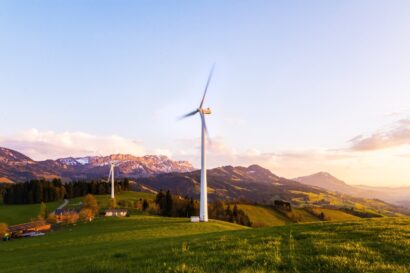AG INSIGHT | 25/10/2024
Exploring what mid- to late-career workers think about ‘green’ jobs

Following the UK Government’s recent launch of the Office for Clean Energy Jobs, Alastair McFarlane, Sustainability Manager at Phoenix Group, shares Phoenix Insights’ latest report which examines the perceptions of the existing workforce towards career switching into roles in a net zero economy.
Delivering net zero is not only a technological challenge, but a human one. While the net zero transition offers clear avenues for economic growth through job creation, skills gaps are a critical challenge hindering delivery of projects. The new UK Government has been explicit in its commitment to the transition and has set a mission to deliver clean power by 2030. The availability of skilled labour will need to increase to meet that ambition, and the emissions reductions set out in the Fifth and Sixth Carbon Budgets. The green skills gap, estimated by the Institute of Environmental Management and Assessment (IEMA) at 200,000 workers, cannot be bridged by new labour market entrants and early career workers alone; encouraging mid- to late-career workers to switch careers is essential to meeting near-term climate goals.
In 2023, the Climate Change Committee estimated that as many as 725,000 jobs could be created by 2030 in low-carbon sectors such as buildings retrofit, renewable energy generation, and the manufacture of electric vehicles. In order to fulfil this potential, encouraging workers with relevant skills and expertise to take up ‘green’ jobs in the short-term is pivotal. This includes mid- to late-career workers, who constitute a substantial and growing proportion of the workforce. Approximately one third of the UK workforce is over the age of 50, many of whom work in sectors that are transitioning or phasing down and have valuable transferrable skillsets.
At Phoenix Insights, we believe that it’s important to build an understanding of how mid- and late-career workers think and feel about ‘green’ jobs, enabling government and employers to put in place the right measures to encourage wider career switching, offer more secure work, and unlock the benefits associated with working for longer. With this in mind, we commissioned research consultancy Public First to conduct focus groups testing the following:
- Are green jobs appealing to mid- and late-career workers?
- What barriers may prevent mid- and late-career workers from changing careers?
- How aware are mid- and late-career workers of the green job opportunities available in their region?
Our research found that many such workers are hesitant to take on these roles, citing concerns such as job insecurity, salary expectations, unclear job descriptions and uncertainty about their qualifications.
Many focus group participants were unable to identify what the term, ‘green job’, meant and felt they would not be able to undertake associated roles. These roles were seen as too technical and better suited to a younger demographic (recent research by the King’s Trust has shown young people also lack interest in green jobs, despite feeling strongly about environmental issues). Mid- to late-career workers also report an averseness to switching careers, citing barriers such as a reluctance to retrain, technological capabilities, and low awareness of opportunities. Though these issues are not unique to green jobs, adding ‘green’ as a descriptor of a role produced the effect among focus group participants of compounding existing barriers to career switching.
The West Midlands, where our focus groups were conducted, is home to several traditional manufacturing industries that are likely to be significantly affected by the transition. Focus group participants, while aware of the narrative around net zero nationally, struggled to identify any actions at a regional or local level to encourage retraining or upskilling, or local opportunities. This was accompanied by a belief that green jobs are ‘future jobs’ that may not be available until the 2030s. This added to the nervousness around career switching, with many mid- to late-career workers planning that their current or next role will their last before retirement.
Through this research, we identified three key recommendations to be taken forward by policymakers, employers and industry associations:
- The UK Industrial Strategy Council and the Office for Clean Energy Jobs should investigate the role of mid- to late-career workers for achieving growth and decarbonisation goals. Greater insights are needed not only on the number, requirements and locations of vacancies, but also the profiles of existing workers who could be encouraged to transition into these roles.
- Further clarity is required on the transferable skills and qualifications that can be applied in green jobs, and case studies of mid- to late-career workers who have successfully completed such career shifts should be amplified.
- Meanwhile, employers seeking to tackle age bias in their recruitment processes should emphasise requirements and pay rather than environmental purpose when promoting green jobs. Job adverts should be clear about what tasks are done in the role, as well as what skills and qualifications are needed to be successful in it.



